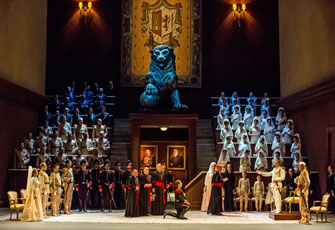Grand Themes,
Intimate Singing

Court scene. Photo © Agathe Poupeney.
The appearance of Pierre Corneille’s play Le Cid in 1637 had a long-lasting effect on French cultural life. Not only did its subject matter – the young hero Rodrigue is forced to kill his lover Chimène’s father in a duel in order to defend his own father’s honor – cause a sensation, but it also gave members of the recently founded Académie Française material for their first major literary debate.
A long series of publications (known collectively as the Querelle du Cid) resulted, in which Corneille’s play was criticized and analyzed for the ways in which it did or did not conform to theatrical rules, such as unities of time, place and action. Some of its subject matter was also deemed inappropriate for a civilized French audience. All subsequent theater in the 17th and 18th centuries responded in different ways to the questions raised by this debate, and (even though the play is about Spain), the play became a symbol of French national prestige.
It seems inevitable that Le Cid, with its grand themes of love, honor, betrayal and sacrifice, would appeal to French operatic composers, and this was certainly the case in the nineteenth century, with composers like Jules Massenet and Claude Debussy both trying their hand. Debussy’s Rodrigue et Chimène was never completed, but Massenet’s Le Cid was first staged to great acclaim in Paris’s Opéra Garnier on November 30, 1885. The work was performed some 150 times up until 1919, when it fell out of the repertory. The present production (the first in nearly a century), also at the Opéra Garnier, is conducted by veteran maestro Michel Plasson and demonstrates that the opera certainly merits a revival.
Massenet and his librettists were not afraid to make significant changes to the Corneille text. The somewhat peripheral role of the Spanish Infanta in the earlier version is given much greater prominence, not least in the opening scene, in which Chimène (performed here by the Italian soprano Sonia Ganassi) begs the Infanta (thrillingly sung by French soprano Annick Massis) to allow her the chance to love Rodrigue. When decisions are made about whether or not to pardon Rodrigue for the crime of killing Chimène’s father, it is Chimène (rather than the king in the Corneille play) who is given much greater agency.
Although knock-out arias are thin on the ground in the Massenet version (perhaps explaining its neglect in the 20th and early 21st centuries), there is plenty of scope for dramatic, vivid and – in the Act 4 duet between Rodrigue and Chimène – touchingly intimate singing. Roberto Alagna’s tone may have coarsened a little, but he is vocally magnificent in the pivotal role of Rodrigue.
Alagna (who was born in France) and Massis are inevitably much more at ease with the French idiom than Ganassi, but all the solo roles are performed with aplomb. Plasson conducts the energetic orchestra and chorus of the Paris Opera with passion and control, even giving the very different musical idioms (in one orchestral interlude, the music becomes a Spanish pastiche, complete with castanets) a character of their own.
Visually, director Charles Roubaud has opted for simplicity, with good use of the large chorus, especially in the scene where the returning Rodrigue is acclaimed for his military feats. However, it was less clear why the military uniforms and women’s clothing began in the nineteenth century and seemed to become more modern as the opera progressed, other than making the rather obvious point that war is waged in all eras.
On the night I saw the opera, technical problems meant that the changeover between acts was unnecessarily long. However, the performers should be congratulated for competing so bravely with those members of the audience who seemed to be engaged in a contest for the most invasive cougher. Catch this production if you can, just in case another century goes by before you or your descendants get a chance to see the opera again.
Opéra National de Paris: Place de l’Opéra, 75009 Paris. Métro: Opéra. Tel.: 0 892 89 90 90 or + 33 (0)1 71 25 24 23 (from abroad). Remaining performances: April 2, 6, 9, 15, 18, 21 at 7:30pm; April 12 at 2:30pm. Tickets: €25-€231. www.operadeparis.fr
Support Paris Update by ordering music and books from Paris Update’s Amazon store at no extra cost. Click on your preferred Amazon location: U.K., France, U.S.
Reader Reaction: Click here to respond to this article (your response may be published on this page and is subject to editing).
© 2013 Paris Update
Favorite